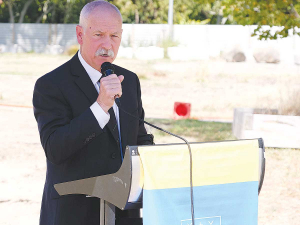Wired for Science: Understanding the feeding habits of mealybug
Fussy children might be frustrating, but fussy mealybugs could help protect the New Zealand wine industry from grapevine leafroll-associated virus 3.
 Lincoln University acting vice-chancellor Professor Bruce McKenzie speaking at the soil turning ceremony.
Lincoln University acting vice-chancellor Professor Bruce McKenzie speaking at the soil turning ceremony.
A new flagship science facility for Lincoln University is further proof of its growing world reputation, claims acting vice chancellor Professor Bruce McKenzie.
He says Lincoln’s significant growth in domestic student numbers, clear government support and a raised awareness of the importance of the agritech industry to New Zealand’s economic development have all factored into its increased profile as a world-ranked land-based university.
Late last month, a ceremony was held to break the first ground of Lincoln’s new science facility. McKenzie says this capped off a ten-year journey for Lincoln, beginning with the Canterbury earthquakes in 2010/11 and concluding with formal Government approval for the construction of the new facility.
“Lincoln University has been producing primary sector graduates for more than 140 years and we remain dedicated to equipping coming generations with the knowledge and skills needed to grow a better future,” he explained.
“It’s only appropriate that we deliver our world-leading education and research from a science facility built for the ages.”
McKenzie says the official government approval, confirmed by Education Minister Hon Chris Hipkins and Finance Minister Hon Grant Robertson in September 2020, reflected the government’s support for Lincoln University and signalled the important role it continues to play in shaping a more productive and sustainable future for New Zealand.
“Our university has always been a chief driver of innovation in the agritech sector, particularly in the food and fibre industries,” he says.
“Our new facilities will position us to take an even more prominent role in developing solutions for the world’s most pressing environmental challenges.”
McKenzie said the fundamental change brought by COVID-19 across many sectors of New Zealand’s agriculture industry in the last 12 months has triggered a steeply rising demand for tertiary education in the land-based sciences.
“Lincoln University, as a globally-ranked land-based university, is strategically placed to capitalise on increased demand for agricultural qualifications from both students and employers,” he added.
“While our international enrolments have predictably declined due to the pandemic, our domestic student numbers have grown significantly.
McKenzie says new domestic undergraduate student enrolments are up 33% on the same time last year, with a record 344% increase for new domestic postgraduate students.
Construction on the new building begins this month and is expected to be completed in mid- 2023. The fit-for-future science facility will feature state-of-the-art teaching, research and collaboration spaces complemented by multi-use adjustable workstations and social zones, all set within a regenerative and bio-diverse park-like environment.
The new flagship science building will have a minimal environmental impact, incorporating roof-mounted and wall-mounted solar arrays, a ground-sourced air conditioning system and a rainwater-fed bathroom flushing system in its design.
Lincoln University is the only New Zealand university to achieve a ranking on the UI Green Metric World University Rankings, currently ranked 51 out of 912 universities.
The new science facilities are part of a wider campus development programme for Lincoln that has already seen the launch of a new student hub and outdoor events space featuring native plantings and a cultural heritage-inspired paved pathway.
The redeveloped LU Gym will offer significantly enhanced fitness, training and wellbeing support to the Lincoln community on its completion within the next several weeks.
Further campus projects including a decarbonisation programme and to cease the combustion of coal by 2024, the restoration of Ivey West and Memorial Hall and an overarching landscaping masterplan, which are all in various stages of development.
Legal controls on the movement of fruits and vegetables are now in place in Auckland’s Mt Roskill suburb, says Biosecurity New Zealand Commissioner North Mike Inglis.
Arable growers worried that some weeds in their crops may have developed herbicide resistance can now get the suspected plants tested for free.
Fruit growers and exporters are worried following the discovery of a male Queensland fruit fly in Auckland this week.
Dairy prices have jumped in the overnight Global Dairy Trade (GDT) auction, breaking a five-month negative streak.
Alliance Group chief executive Willie Wiese is leaving the company after three years in the role.
A booklet produced in 2025 by the Rotoiti 15 trust, Department of Conservation and Scion – now part of the Bioeconomy Science Institute – aims to help people identify insect pests and diseases.